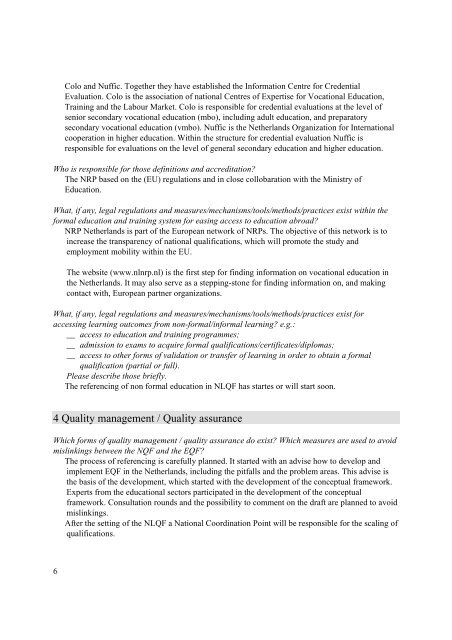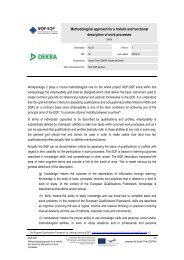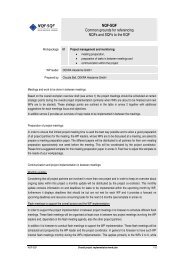Overview of National Qualification frameworks - Project-Nqf-Sqf
Overview of National Qualification frameworks - Project-Nqf-Sqf
Overview of National Qualification frameworks - Project-Nqf-Sqf
Create successful ePaper yourself
Turn your PDF publications into a flip-book with our unique Google optimized e-Paper software.
Colo and Nuffic. Together they have established the Information Centre for CredentialEvaluation. Colo is the association <strong>of</strong> national Centres <strong>of</strong> Expertise for Vocational Education,Training and the Labour Market. Colo is responsible for credential evaluations at the level <strong>of</strong>senior secondary vocational education (mbo), including adult education, and preparatorysecondary vocational education (vmbo). Nuffic is the Netherlands Organization for Internationalcooperation in higher education. Within the structure for credential evaluation Nuffic isresponsible for evaluations on the level <strong>of</strong> general secondary education and higher education.Who is responsible for those definitions and accreditation?The NRP based on the (EU) regulations and in close collobaration with the Ministry <strong>of</strong>Education.What, if any, legal regulations and measures/mechanisms/tools/methods/practices exist within theformal education and training system for easing access to education abroad?NRP Netherlands is part <strong>of</strong> the European network <strong>of</strong> NRPs. The objective <strong>of</strong> this network is toincrease the transparency <strong>of</strong> national qualifications, which will promote the study andemployment mobility within the EU.The website (www.nlnrp.nl) is the first step for finding information on vocational education inthe Netherlands. It may also serve as a stepping-stone for finding information on, and makingcontact with, European partner organizations.What, if any, legal regulations and measures/mechanisms/tools/methods/practices exist foraccessing learning outcomes from non-formal/informal learning? e.g.:__ access to education and training programmes;__ admission to exams to acquire formal qualifications/certificates/diplomas;__ access to other forms <strong>of</strong> validation or transfer <strong>of</strong> learning in order to obtain a formalqualification (partial or full).Please describe those briefly.The referencing <strong>of</strong> non formal education in NLQF has startes or will start soon.4 Quality management / Quality assuranceWhich forms <strong>of</strong> quality management / quality assurance do exist? Which measures are used to avoidmislinkings between the NQF and the EQF?The process <strong>of</strong> referencing is carefully planned. It started with an advise how to develop andimplement EQF in the Netherlands, including the pitfalls and the problem areas. This advise isthe basis <strong>of</strong> the development, which started with the development <strong>of</strong> the conceptual framework.Experts from the educational sectors participated in the development <strong>of</strong> the conceptualframework. Consultation rounds and the possibility to comment on the draft are planned to avoidmislinkings.After the setting <strong>of</strong> the NLQF a <strong>National</strong> Coordination Point will be responsible for the scaling <strong>of</strong>qualifications.6




